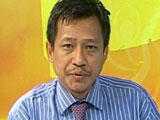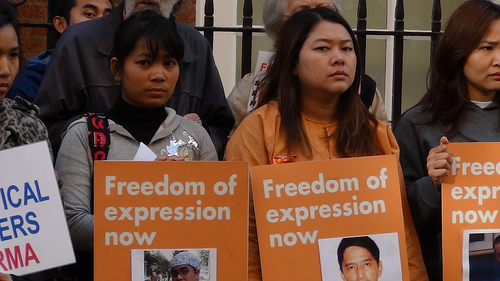Spokespersons and Reporters in Transition
by Than Win Htut / June 13, 2012 / No comments
Burma’s uncertain process of democratization
“Reforms? What reforms? I prefer to talk about improvements in our country, because reform could mean whatever it is that the person using the word may wish it to mean. But for me, reform means improvement to the condition of our people,” said Daw Aung San Suu Kyi in her recent speech at the World Economic Forum on Asia 2012.

- Though the video journalists of Democratic Voice of Burma provide daily news stories for Burma’s media, what no one gets to see is what happens behind the camera, off screen. I ask them why they do what they do and what they see as they expose a country that has been under the shadow of dictatorships for decades.

- Than Win Htut joined Democratic Voice of Burma since 2005 as a senior producer and began working as a sub-editor in tv news last year. After leaving Burma, Than lived on the Thai-Burma border and wrote for many exiled media outlets including Khit Pyaing, Amyin Thit, The Irrawaddy Magazine, and Mizzima News. He produces his own weekly science and technology TV show called “Khit Hlaine,” working with around 40 Burmese reporters living in Thailand and 40 living in Burma. He currently lives in Oslo, Norway.
It’s true. Reform could mean something different to her and to me. As a politician and a national leader, she could interpret it as the improvement of our impoverished country by creating new jobs for the young, unemployed workforce. To me, as an exiled journalist, reform could address another aspect of the so-called democratization: The newly forming media landscape in Burma/Myanmar.
Transition
“Reform? What reform?” To me, it could also mean transition. This June, Burmese media inside and outside of the country is undergoing a series of changes. Officials have promised that there will not be any more censorship as soon as the new set of media laws is approved by parliament. Despite this fact, the Press Scrutiny Board is still doing its notorious job and deciding what reporters cover.
Now many brave local journalists are testing the censor board’s tolerance from multiple angles, openly reporting sensitive news topics that were almost impossible to touch in the past. Because some of these reports were not approved by the censor board, we are reminded that they are still trying out the “transition” before involving the entire media landscape in a fully democratic society.
Reform or improvements? Whatever you call it, the truth is that Burma/Myanmar’s ongoing political process has earned applause from optimists at regional and international levels. Since 14 underground video journalists from the Democratic Voice of Burma (DVB) were released from prison earlier this year, almost all have continued their work and picked up their cameras again. Are they working legally? Not yet. Are they taking a serious risk of getting arrested? We don’t have a clear answer.
Though I use “transition” to refer to the gradual reform lead by military-leaders-turned-civilians, large portions of the administration are still reluctant to deal with media circles. There is only a small percentage of government officials who have started to talk openly with reporters and enjoy photo opportunities.
The strongest opposition party, the National League for Democracy, led by the charismatic Aung San Suu Kyi, has also been struggling with media management and public relations in the new media landscape. There are many drowsy spokespersons in both government and opposition departments, who are unprepared for rapidly moving crowds of reporters. The left hand also knows nothing about the whereabouts and actions of the right hand, which leads to frequent answers of “We don’t know yet,” “No comment,” or remaining tight-lipped—a technique derived from the era of military regime.
Not only are political parties not used to this process, which is steadily becoming clearer, but also media organizations, editors, reporters, and other media professionals have to become accustomed to the change and deal with the many challenges of training for the democratic transition.
If someone were to ask me about DVB’s reporters, “What about underground video journalists in the newly above-ground media landscape? Are they fitting into the new framework?” I’d say frankly, “Not yet, but we’ll see.”





